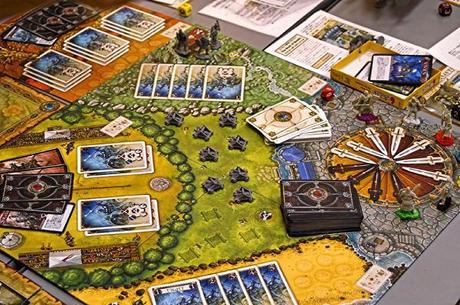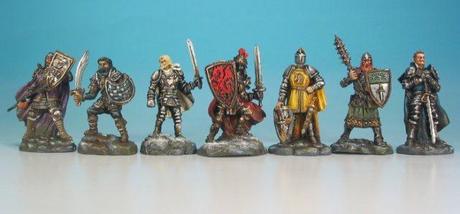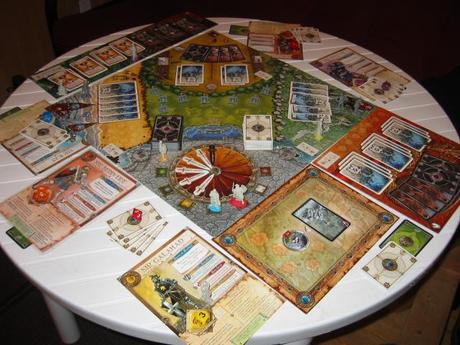Publisher: Days of Wonder
Style: Adventure, Co-Op, Betrayal
Players: 3-7
Play Time: 60 minutes
If Shadows Over Camelot was a person and I could say one thing to it, I would say ‘fuck you, Shadows Over Camelot‘. Few board games aggravate me the way SoC does. As with many co-op games there’s quite a bit of challenge to overcome, but I can’t think of any game that stacks the odds against the players like SoC.
Each player takes on the role of a knight of the round table, from King Arthur to Sir Kay, and together they have to hold back the many forces of evil that are threatening the realm. Among the threats are invading hordes of Saxons and the Picts on opposing borders, a siege of catapults massing outside of Camelot, the Black Knight competing in a tournament, the Holy Grail is threatened to be lost, Sir Lancelot has rebelled and needs to be brought to heel and the sword of Excalibur must be found. And there’s possibly a bloody great dragon.

One each turn you make two moves – one to progress evil and one heroic action. You can draw a black card that will advance the evil progress on a quest, place a catapult in the siege area or fall on your sword and lose a hit point. In the number of catapults reaches 12, you lose. If the round table has more black swords (placed when a quest fails) than white you lose. If you all die, you lose. After this damned-if-you-do option is complete you can perform a heroic action by moving to another quest location, playing a card to work towards completing a quest or spend cards to regain a hit point. Completing quests gets you bonus cards and lives, and sometimes special items like the Holy Grail, Excalibur or Lancelot’s Armour, but the key item is the white swords. The only win condition is having 12 swords on the round table with the majority being white.
If you’ve done the math, that’s eight threats coming at you all at the same time. Even with the full seven players you don’t have the odds in your favour. Even if you’ve got the cards needed to complete the Grail quest they’ll be six bad things happening before you get each turn, any one randomly making your quest harder to complete. Unlike other co-op games like Pandemic you will never feel like you have the upper hand until the game is successfully over, and you’ll never feel like you’ve had enough chance to fight back.

Oh, and there might be a traitor. Eight loyalty cards get distributed at the beginning of the game – seven of them mark you as loyal and one as a secret traitor who must secretly attempt to undo the knights efforts from within. You don’t want to get caught though, as it scores big points for the heroes. Co-operating becomes a bit trickier when one person might be undermining your efforts. You may have noticed that there’s eight loyalty cards for the seven players, so you may not even have a traitor.
Being a Days of Wonder brand game, creators of my absolute favourite, most played game (which I’ll review in a future instalment) this is a great looking game. The seven unique knights are great figures, with lots of detail carved into them (there’s the option of coughing up for the painted set, which look even better – pictured above). The boards are beautifully drawn, and are among the most colourful boards you’ll have in your collection. One thing needing a change up is printed spaces for cards to be played – they’re so well detailed it can be difficult to distinguish placed cards from black spots. The three mini-boards for the Grail, Lancelot and Excalibur quests are a strange design choice but it is handy for fitting all the play areas into whatever space you’re playing in.

The game sounds rough, and you’ll fail at it many times before you work out a workable plan. Team dynamics become important and the added drop of paranoia makes the human interaction one of the most fun parts of the experience. It’s difficult but not unbalanced – the game is intentionally difficult rather than poorly designed. In spite of the frustrations that come with the limitations on the player actions and difficultly level but with the right group of players you’ll have fun playing this. When you do finally score that win it’ll be all the more satisfying having had to think your way through the set-up, pick the best approach and work together to achieve the goals. We recommend Shadows Over Camelot, but best not play with the easily frustrated and prepare to cop a few loses in the first couple of rounds. Plus being a knight of the round table is always badass.

